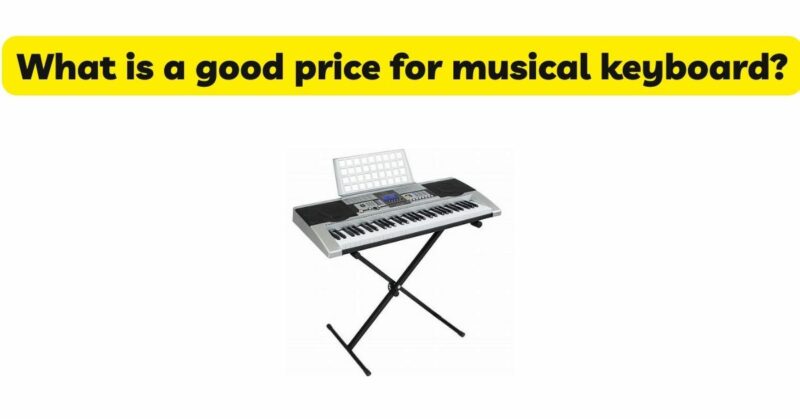When considering the purchase of a musical keyboard, finding the right price point is crucial. The price of a musical keyboard can vary widely depending on various factors such as brand, features, quality, and intended use. In this article, we delve into the factors that contribute to the pricing of a musical keyboard and explore what constitutes a good price. By examining these factors, we aim to provide insights into determining a fair price for a musical keyboard, taking into account considerations such as keyboard types, key action, sound quality, built-in features, brand reputation, and overall value for money.
- Keyboard Types and Key Action: The type of keyboard and key action significantly impact the price of a musical keyboard. Keyboards can range from basic MIDI controllers to sophisticated workstation keyboards or stage pianos. The complexity of the key action, such as weighted, semi-weighted, or synth-action, also plays a role in determining the price. Higher-end keyboards with weighted keys and realistic key action tend to be more expensive, offering a more authentic playing experience.
- Sound Quality and Sample Libraries: Sound quality is a crucial consideration when evaluating the price of a musical keyboard. High-quality keyboards often feature advanced sound sampling technology to produce realistic and expressive sounds. The complexity and accuracy of the sample libraries impact the overall sound quality and versatility of the instrument. Keyboards with extensive sample libraries and advanced sound processing capabilities tend to have a higher price tag, as they offer a wider range of sonic possibilities and professional-grade sound reproduction.
- Built-in Features and Technology: The presence of built-in features and advanced technology can significantly affect the price of a musical keyboard. Higher-end models often include features such as built-in speakers, multi-track recording capabilities, USB connectivity, MIDI compatibility, onboard effects, and advanced sound manipulation options. Additionally, the availability of performance controls, such as sliders, knobs, and assignable buttons, can enhance the versatility and expressiveness of the instrument. The inclusion of these features adds value to the keyboard but also contributes to a higher price point.
- Brand Reputation and Quality: Brand reputation and quality play a significant role in determining the price of a musical keyboard. Well-established brands with a history of producing high-quality instruments often have a premium price associated with their products. These brands invest in research and development, use premium materials, and have a reputation for superior craftsmanship. While instruments from reputable brands may come at a higher cost, they often provide better build quality, reliability, customer support, and long-term durability, making them a worthwhile investment.
- Entry-Level vs. Professional-Grade Keyboards: The price of a musical keyboard can vary based on whether it is an entry-level or professional-grade instrument. Entry-level keyboards are generally more affordable, offering basic features and functionality for beginners or casual musicians. These keyboards provide a solid foundation for learning and practice. Professional-grade keyboards, on the other hand, cater to the needs of advanced musicians, offering more advanced features, superior sound quality, and enhanced performance capabilities. Professional-grade keyboards often come at a higher price due to their advanced technology and extensive features, making them suitable for studio recording, live performances, and music production.
- Value for Money: Determining a good price for a musical keyboard ultimately comes down to the value it provides for the price paid. Consider the overall package, including the quality of construction, the range and quality of sounds, the capabilities and features offered, and the longevity of the instrument. Assessing how well the keyboard aligns with your musical goals, preferences, and skill level is crucial. A good price strikes a harmonious balance between the quality and features of the keyboard and its affordability within your budget.
Conclusion: When considering the price of a musical keyboard, factors such as keyboard types, key action, sound quality, built-in features, brand reputation, and overall value for money come into play. The price range for musical keyboards can vary significantly, accommodating different budgets and musical needs. It is essential to strike a balance between the features and quality of the instrument and its affordability within your budget. Understanding your specific musical goals, preferences, and skill level is crucial in determining what constitutes a good price for a musical keyboard. Additionally, researching and comparing different models, reading customer reviews, and seeking guidance from knowledgeable professionals can help make an informed decision. By carefully considering these factors, prospective buyers can find a musical keyboard that offers an enjoyable playing experience, reliability, and value for their investment.


